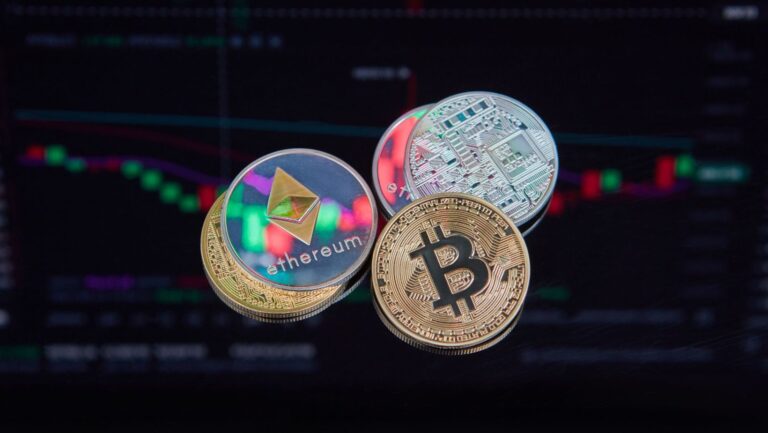Is Bitcoin going to reach $1 million dollars? What will happen to the entire crypto industry? Will the Bitcoin ETF increase the value of the entire crypto market?
These are the questions that every investor wants to know, but let me tell you at the beginning, no matter how good of an expert someone is, nobody knows what will happen in the market, at least not in the short term.
But that doesn’t mean that we cannot speculate. After all, we’ve already seen some big changes in the crypto world, which laid a foundation for the industry, and it already started to show us what the future will look like.
So, where is crypto heading? Is it going to be a wild rollercoaster forever, or is it going to settle into something more predictable?
Will Bitcoin Keep Mooning or Busting?
We as crypto enthusiasts, love to talk about Bitcoin’s price predictions, it’s something that drives us closer to crypto even more. On top of that, Bitcoin is without a doubt the biggest cryptocurrency on the market, and the way Bitcoin moves, the rest of the industry follows.
So, the main accent is always placed on Bitcoin. In the last couple of years, it has been a wild ride. But not only has Bitcoin recovered, but also reached a new all-time high. Maybe it was because of the Bitcoin ETF approval, who knows?
Since then the price dropped a little bit, but we are just starting on the bull market. Many people believe that Bitcoin’s price will go to the moon in the next couple of months and years. If we look at the popular Bitcoin Rainbow Chart, which accurately predicted its price multiple times, we are talking about an all-time high of $286,000 by 2029.
This is a popular long-term price projection tool, but it is a chart that only includes past price behaviors and not many external factors like regulatory changes or technological advancements.
Does this mean that the price will go even higher? In fact, many experts believe that in the next decade, Bitcoin will be close to $1 million, especially with the mass adoption and big institutions like Blackrock suddenly showing interest in this asset class.
But let’s zoom closer a bit, and focus on the next few years. What’s ahead for Bitcoin? We can see a strong Bitcoin adoption and a lot of action. BTC is used for many things now, even for gambling at an online crypto casino. However, there is a strong suggestion that the volatility will stick around so prepare for a wild ride. Remember, you should always focus on your long-term goals, and avoid stressing out from short-term price fluctuations.
So, what about 2025? What can we expect? Well, there are a lot of mixed opinions. Some people believe that 2025 will be the year when Bitcoin will reach an all-time high of $175,000 before we see a cooldown.

Others believe that this number will be much lower, closer to $100K.
According to experts, they see us leaving the bull market next year, and entering a lot of sideways movement in 2026 and 2027, before entering a new bullish cycle by 2028-2029.
Ahh…here we go again.
But one thing is for sure, many of the experts and analysis point out that the price of Bitcoin should rise in the near future.
Ethereum
Of course, it isn’t only about Bitcoin. Although the price of Ethereum is following Bitcoin’s footsteps most of the time.
So, what’s ahead of Ethereum? Well, we can expect an Ethereum ETF soon, which will pump up the price in the short term.
But what about the next couple of years? Well, many experts believe that ETH could hit the $10,000 mark by 2028, and even climb as high as $12,000 in 2029.
Ethereum ecosystem is where this coin draws its power, thanks to smart contracts, DeFi, and NFTs, which means that the price of Ethereum is more connected to technological innovations compared to Bitcoin.
So, I think there is a bigger margin for error when predicting Ethereum’s price, where a new technological trend can change things up, and make ETH totally independent of Bitcoin.
Will Ethereum take over Bitcoin’s throne? Maybe not, but it’s clear that both have carved out distinct paths. Ethereum is particularly poised for growth due to its Layer 2 solutions (like Arbitrum and Optimism), which enhance efficiency. So, while Bitcoin may be the king of store-of-value, Ethereum could become the reigning platform for decentralized applications.
The Regulation Wildcard: Friend or Foe?
Ah, regulation—the one thing that makes crypto purists shiver. Recent years have seen major lawsuits, particularly in the U.S., against giants like Binance and Coinbase. The SEC is adamant that many cryptocurrencies are unregistered securities, and regulatory crackdowns could shape the market drastically. But it’s not all doom and gloom—Ripple, for instance, recently scored some wins against the SEC, showing that regulators and crypto companies are still working out how to coexist.
How will regulation impact the next five years? Tough question. On the one hand, more regulation could bring stability and legitimacy, encouraging wider adoption. On the other hand, too much oversight could choke innovation, especially in DeFi (decentralized finance). Governments will need to find a sweet spot between security and innovation.
Will Crypto Finally Go Mainstream?
Let’s face it: buying and using crypto isn’t exactly grandma-friendly right now. User experience still leaves a lot to be desired, especially when it comes to security and ease of use. But the good news? Innovations in wallet design, along with Layer 2 scalability solutions like Bitcoin’s Lightning Network and Ethereum’s zero-knowledge tech, promise to make crypto transactions faster and easier. Think less “what’s my private key again?” and more “tap to pay.”

In the next five years, we’ll likely see these improvements paving the way for more mainstream adoption. Crypto might finally get its “iPhone moment,” where the technology becomes as easy as swiping a card.
The Big Questions: What Could Go Wrong?
Of course, it wouldn’t be crypto without a few curveballs. Hacks, security issues, and regulatory bans remain concerns. We also can’t ignore the impact of economic conditions—if inflation spikes or we enter a major recession, it could lead to capital flight from riskier assets like crypto. But on the flip side, some argue that crypto is a hedge against inflation, so it’s anyone’s guess.




